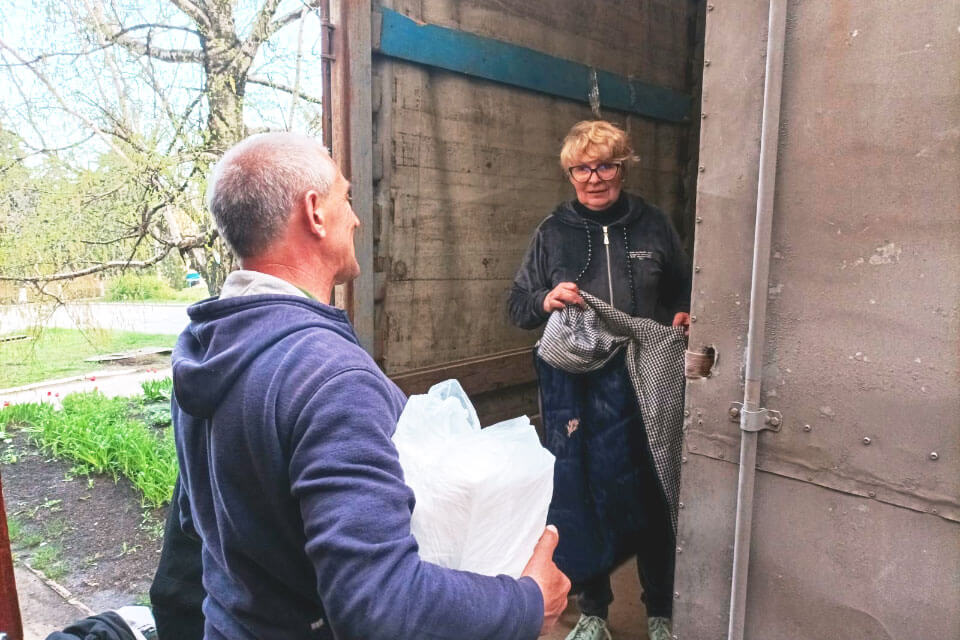UN Women Ukraine delivers humanitarian aid to those most in need in eastern Ukraine
Date:

Currently, 15.7 million people in Ukraine are in urgent need of humanitarian assistance and protection. Attacks on populated civilian areas and infrastructure continue in eastern and southern parts of Ukraine, endangering people’s lives and access to basic services.
UN Women Ukraine has reprogrammed its activities to reach those women and men that are most in need of essential items not available in the territories experiencing the fiercest attacks in the eastern Donetsk region.
“My husband has a disability and is immobile. I know that there are volunteers who help the disabled move to safer areas, but my husband also needs special care,” explains Lyudmyla, a pensioner from Oleksandrivka, a small town in Donetsk. “And this includes not only the medicines. He needs special hygiene items and special treatment. So, we decided to stay.”
Before the full-scale Russian invasion, Oleksandrivka was home to more than 12,000 people. Of the few who have stayed, many are elderly, people with disabilities and women with children who have nowhere else to go.
People with disabilities, including older persons, face challenges in accessing shelter and are at a high risk of abandonment and family separation. While others rush to safety, people with physical impairments are sometimes left behind. Due to stigma around disability and the lack of specialized services, adults and children with disabilities are often placed in institutions away from home. There are huge concerns about their access to services and safety in the current context.
“I have five children, the oldest is 10 and the youngest twins have just turned 3. My husband is in the army, so we are alone here. There was no point to leave; the whole country is on fire,” says Anastasia, a young woman from the city of Kramatorsk in Donetsk, where up to 250,000 people lived before the war. “Locals are saying that roughly two-thirds of the population have already left the city. It was difficult before the war, but now it’s just a catastrophe. There is nothing left. Diapers, baby food or hygiene items are nowhere to be found.”
In the government-controlled areas of Donetsk and Luhansk, 71 per cent of households were female-headed, prior to 24 February, but the number has only grown since the invasion. Some men are being conscripted, while others join the Armed Forces of Ukraine voluntarily through the Territorial Defence Forces. Women carry an increased burden of domestic work, including caring for elderly family members.
“I took on the responsibility of helping my neighbours. Most of the residents have evacuated, and only the elderly and people with disabilities stayed. They have no one. They are weak and cannot move,” says Olga, a volunteer from Kramatorsk. Her daughter’s family is in Mariupol, but she says supporting others helps her cope with her own trauma.
In cooperation with regional authorities and with the help of local volunteers, UN Women delivered the most scarce essential items, including baby food, hygiene items, as well as diapers for children and people with disabilities living in the area of active combat in eastern Ukraine.
“We collect applications for humanitarian aid via the website of the regional administration. We receive up to 400 requests per day,” explains Ihor Stashkevych, Secretary of the Kramatorsk City Council. “We have allocated a separate centre to deliver the help to women with children. We try to apply a flexible approach to all vulnerable categories. The help of volunteers is a huge support. They help to reach and bring the help to those most in need.”
The humanitarian assistance delivered to the most vulnerable women and men in the local communities of Donetsk region was provided under a gender equality project implemented by UN Women Ukraine in conflict-affected Donetsk and Luhansk regions, which is funded by the Government of Denmark.